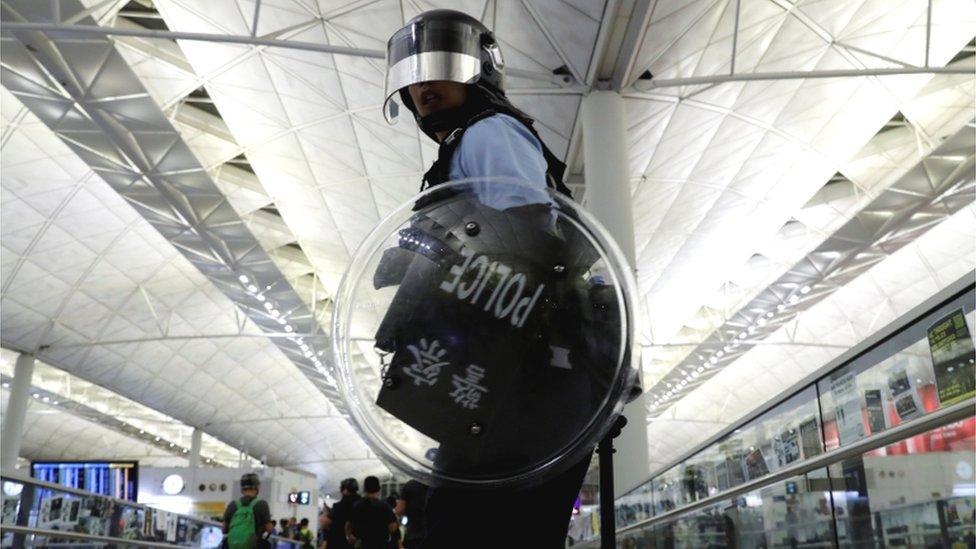Hong Kong: China condemns defiant opposition lawmakers
- Published
Hong Kong opposition members announce mass resignation
The Chinese government has condemned the mass resignation of most of Hong Kong's opposition from parliament as an "open challenge" to its authority.
Nearly all pro-democracy lawmakers quit in protest after four of their colleagues were deemed threats to national security and dismissed.
Many see Hong Kong's limited democracy as now being in its death throes.
The UK government has accused China of breaching its commitments to protect Hong Kong's autonomy.
The former British colony became part of China in 1997 but was promised it could keep some unique freedoms for 50 years.
UK Foreign Secretary Dominic Raab said of Wednesday's move to remove the four lawmakers: "Beijing's imposition of new rules to disqualify elected legislators in Hong Kong constitutes a clear breach of the legally binding Sino-British Joint Declaration.
"China has once again broken its promises and undermined Hong Kong's high degree of autonomy."
The US also condemned what had happened, external, saying it was a move towards "one-party dictatorship", while the EU called for an immediate reversal of the decision., external
Hong Kong's government and authorities in Beijing have defended the disqualifications as lawful.
Tea, drugs and war: Hong Kong's British history explained
They were based on new rules from China saying elected legislators should be disqualified if they support Hong Kong's independence, refuse to acknowledge China's sovereignty, ask foreign forces to interfere in the city's affairs, or in other ways threaten national security.
The mainland authorities in Beijing have taken increasingly repressive measures in Hong Kong since mass protests rocked the city last year.
Activists have fled and political parties have disbanded following Beijing's passing of a new National Security Law in June, which criminalises vague acts including "subversion". The imposition of the law was also deemed by Britain to have breached the joint declaration, which was signed in 1984.
On Thursday, in response to the disqualification of their colleagues, 15 lawmakers sent in their resignation letters. Their exodus will leave a once-vibrant legislature filled with politicians seen as loyal to the mainland authorities.
In a last act of defiance, one opposition lawmaker unfurled a banner in the assembly building on Thursday saying the city's leader, Carrie Lam, was hurting Hong Kong. "She will stink for 10,000 years," it read.

A last act of defiance from Hong Kong's opposition
China's Hong Kong and Macau Affairs Office on Thursday said the mass walk-out openly challenged the central government's authority and the Basic Law, Hong Kong's mini-constitution.
It also said the move showed pro-democracy lawmakers' "stance of stubborn resistance" against the central government.
"If these lawmakers hope to make use of their resignation to provoke radical opposition and beg for foreign interference, they have miscalculated," a spokesperson said.

A crippled legislature?
by Grace Tsoi, BBC World Service, Hong Kong
The four disqualified lawmakers will not face further consequences - at least for now.
The decision to oust the lawmakers "is not equivalent to any criminal proceedings", government adviser Ronny Tong told me.
The National Security Law, which took effect in June 30, is not retrospective, even though it is often criticised as broad and vague.
On the other hand, political commentator Johnny Lau believes that Beijing has already achieved what he sees as its sole purpose - seizing control of the city's legislature, thus leaving no need for further action.
"The legislature is crippled," he says, adding that any further crackdown on the four lawmakers could be counterproductive and lead to more public sympathy.
Instead, Mr Lau says, Beijing will focus its energy on passing laws deemed beneficial to the mainland in the remaining term of the parliament.

One of the lawmakers who resigned, Claudia Mo, told the BBC that she and her colleagues felt they had to take a stand.
"We owe a display of solidarity with our colleagues who were ousted," she said. "We need to protest against what could be the ultimate Beijing crackdown on Hong Kong - to silence the last bit of dissent in the city.
"They're lining us up to oust us bit by bit. What's the point of staying on like this, thinking will I be ousted today or not?"
The city's 70-seat legislature has 21 opposition members. Only two of those will now remain in the parliament.

Hong Kong has seen waves of sometimes violent protests
Why were the four dismissed and who are they?
The four had already been disqualified from running in the next election, originally scheduled for September 2020 but postponed to next year. But until now they had remained in parliament.
Beijing and Hong Kong officials have not given details on how exactly the four men had contravened the rules. All four are considered moderates and they have never supported Hong Kong independence.
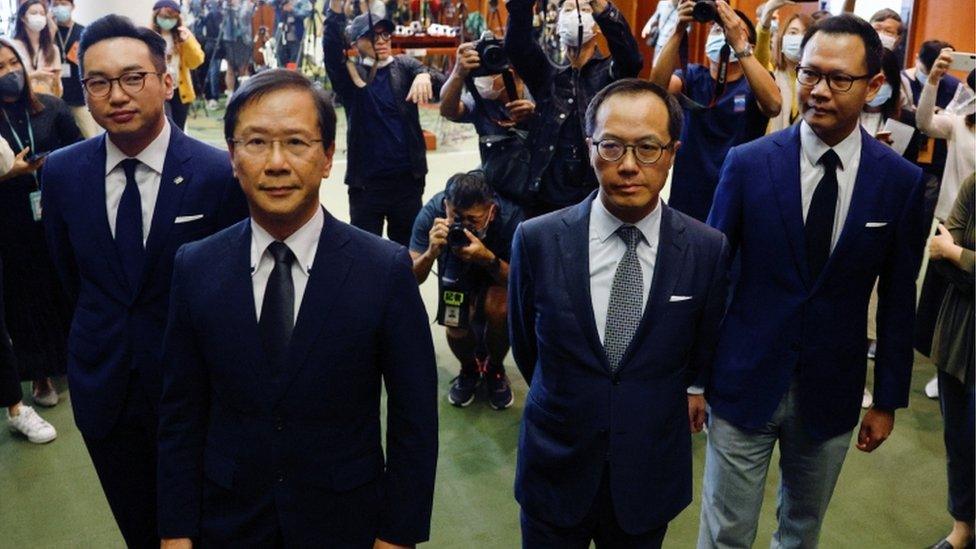
Alvin Yeung Ngok-kiu, Kwok Ka-ki, Kenneth Leung and Dennis Kwok
Alvin Yeung: Leader of the pro-democracy Civic party and a practising barrister. He was banned from taking part in this year's election after he signed a joint letter to US senators calling for sanctions on Hong Kong.
Dennis Kwok: The barrister is a founding member of the Civic Party. He was earlier accused of paralysing LegCo by using filibustering tactics, in a move the Chinese government called "malicious", external. He was banned from elections after signing the sanctions letter.
Kenneth Leung: The senior tax consultant is a member of the pro-democracy parliamentary group, the Professionals Guild. According to news site SCMP, officials barred him from the elections after accusing him of indirectly appealing to the US government for sanctions.
Kwok Ka-ki: The Civic Party member was also barred from contesting in this year's elections. However, the urologist did not sign the joint letter or attend a trip to the US. Officials said he had a "purported intention to call on foreign powers to sanction Hong Kong", according to SCMP.
What does this mean for Hong Kong?
The developments underscore the rapid expansion of Beijing's influence in the territory, pushing for loyalty from all levels of power.
Observers say that without the pro-democracy lawmakers, there will be no effective opposition and LegCo will be reduced to a rubber-stamp parliament.
The city's leader is already chosen by pro-Beijing committees, and only half of the LegCo seats are directly elected.
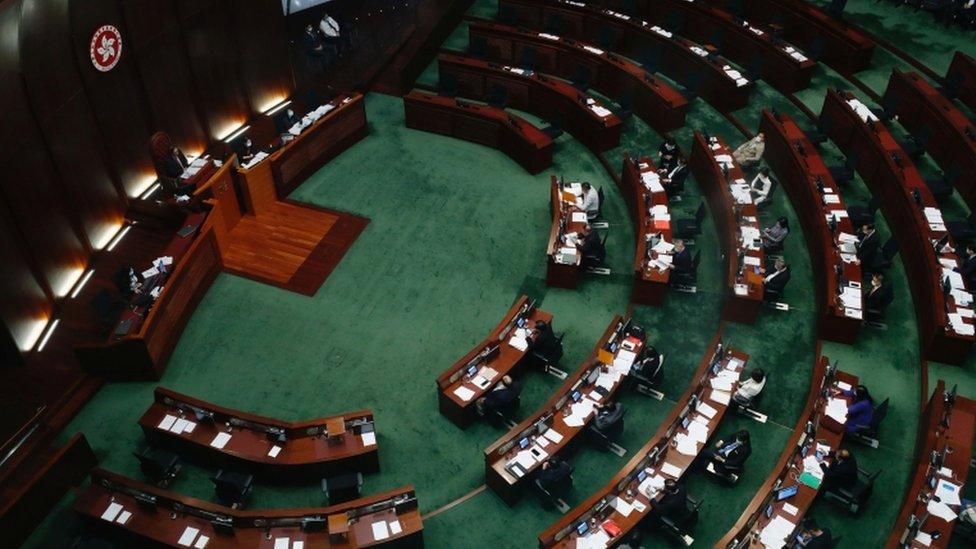
Hong Kong's LegCo - critics say it will now merely be a rubber-stamp legislature
Under the terms of the handover between Britain and China, Hong Kong was meant to have its own legal system, multiple political parties, and rights including freedom of assembly and free speech for 50 years.
The "one country, two systems" principle - named so because such rights do not exist elsewhere in China - is enshrined in the Basic Law.
- Published11 November 2020
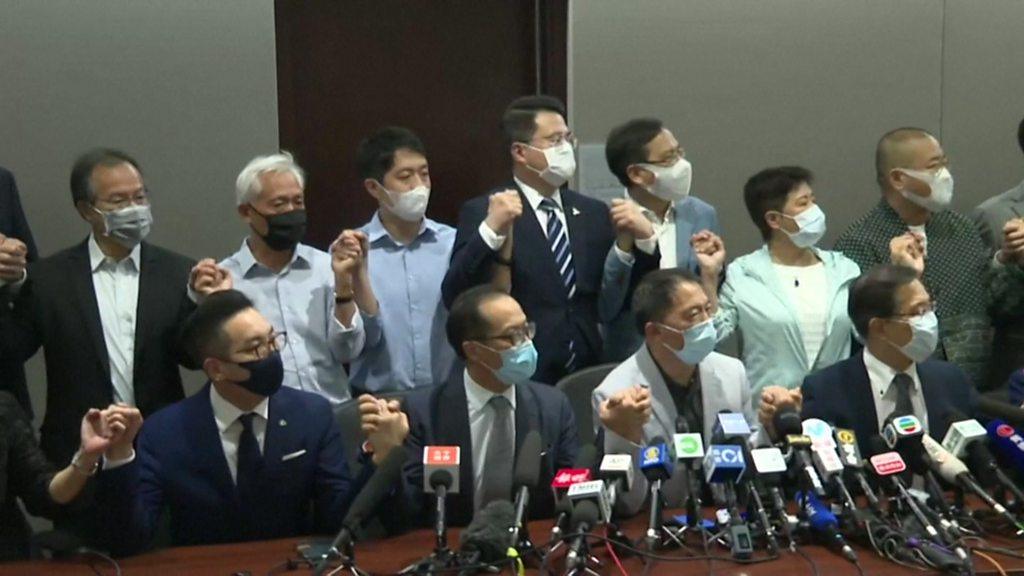
- Published19 March 2024
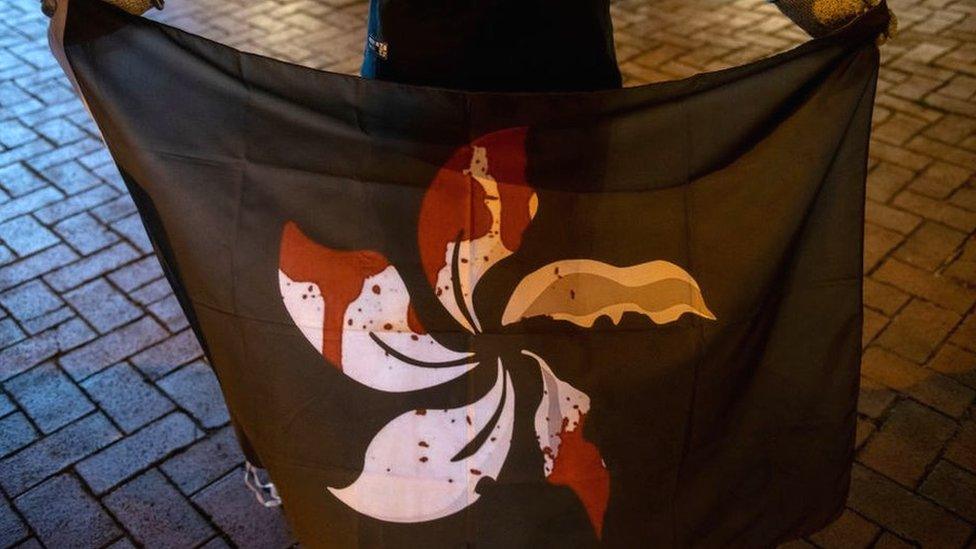
- Published9 November 2020
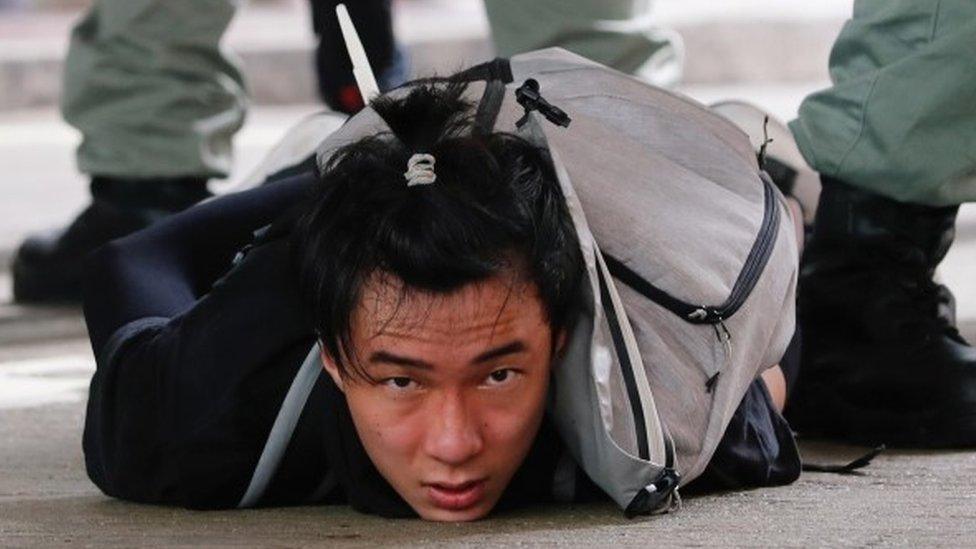
- Published6 November 2020
